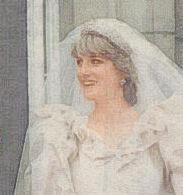 |

|
|
Lady Diana Spencer was a shy nineteen-year-old with a child on her hip and another on her hand. She stood, back to the light, her head shyly tilted down, her eyes wary from behind her protective fringe. It was a photograph seen around the world, one of many, many to come. She was the girl who had won the heart and hand of the world's most eligible bachelor. She cared for children; she was a noblewoman who worked. She was living the dream, she was going to be a princess, a queen. She would be rich, and famous, and envied, and courted, and loved. At 19, Diana was Shy Di, the girl who became Princess Di in a fairy princess dress in a fairy tale coach in a royal ceremony. | |
 |
| If marriage was still the career for women, she had achieved the pinnacle of her profession -- she quickly became wife to one future king and mother to another (Sweet William).
But Diana awoke from her dream into the strange unreality women know so well. Everything she did, everything she said, was judged. Her hair, hats, weight, manners -- all were recorded and discussed as if she was an object: an idol, perhaps, but not quite a person. She was loved for what she represented because, after all, how could strangers know her, alone in her palace with her much-older husband. The eager people who cheered and brought her flowers knew her only through the eager filter of the media. The media who used her image, her story - fiction and fact to sell advertising space to merchants all around the world. When did she begin to realise that this was not a fairy tale? When did Diana look into her husband's eyes and see the emptiness of a man looking at the woman he did not want? That hollow stare of a man who is emotionally absent? Diana lived the life we all live, she loved the wrong man, she made the wrong choices, she suffered depression and self-doubt, she despaired, she dieted, and all with an audience as voracious as thirst-stricken vampires. Diana gave us her joy, her happiness; she shared her successes. Nothing was truly hers, and hers alone after that photograph. Even her sons were the sons of England. When we mortals say something foolish, few people witness our embarrassment. When we are tricked, how many know of it? When we fall, who sees? When Diana dreamed, or when the night mare ran, there was always an audience. Diana gave, and what Diana did not give was stolen from her. | |
She died in a foreign land, her life ripped from her in a terrifying last moment of fear. The chase, like a fox running before the hounds, the jeering, inescapable weight of those men chasing, forever chasing her. Nothing Diana could ever do or say could free her of them, not hiding, not coming forward, not pleading, not begging, not suffering. They came forever onwards. And as Diana was sped through the night unable to escape her taunting relentless stalkers, there was the terrible moment when the car slid out of control, when no act or scream could save her, when the car rolled, and the pain came, and she fell, bleeding, fallen in mortal combat against the camera-spies-for-hire. Even as she lay dying it was not enough for these men, they pushed, they prodded, their hunger for the money that blood-letting brings caused them to hinder, not help. | |
She was dead, and half a world away I could not save her. My anger and outrage is always ready to flare against intrusions, be they from the battleaxe around the corner, the nasty Mr Gossip at work, or the professional sneak. Now it burned, impotent -- the girl who became a woman in the glare of public sight was dead. A sister had fallen, brought down by greed and arrogance. Until that moment, I did not know that I thought her immortal. That I expected her to be there, visiting and comforting the ill and distressed, dressed in her finery at great and worthwhile occasions, giving her name and her time to causes. I thought I would grow old in her company. I expected, perhaps, decades from now, that she would be a grand old lady with an ebony walking stick. I wanted her back. With her death, I had lost any chance to protect her from invasion. Diana was dead. She wasn't a saint, she wasn't a goddess. She wasn't gifted with great intellect or, as far as we know, any special talent, except that she cared, and she paid attention, and it is hard enough in this world to find anyone who is willing to do just that. | |
There are two ways that we can carry on the work of Diana: one, we can choose our causes and work for them, and two, we can choose never, never, again to buy any paper or magazine, to watch any television program that puts money over the rights and lives of others. Celebrities like Whoopi Goldberg have been making a stand against these shows and rags for years, if now attention is paid to this cause, the one which claimed Diana's life, then her death, like her life, will have meaning. | |
Now cracks a noble heart. Good night, sweet prince, And flights of angels sing thee to thy rest! Hamlet, Wm Shakespeare | |
Ali Kayn, September 1997 |
|
Like us on facebook |
|
|
|
|
|
|
Celebrate everything!
www.festivale.info
ISSN 1328-8008
Published in Melbourne, Victoria, Australia
disclaimers | contact the editor | Festivale revision history
 Published in Melbourne, Victoria, Australia
Published in Melbourne, Victoria, Australia  copyright © Festivale 2009 All rights reserved
copyright © Festivale 2009 All rights reservedFiled: 3-Sep-1997
Entire site refreshed: Dec 2008-Feb 2009 | Site URL transferred: Jan 2005 (previously www.festivale.webcentral.com.au)